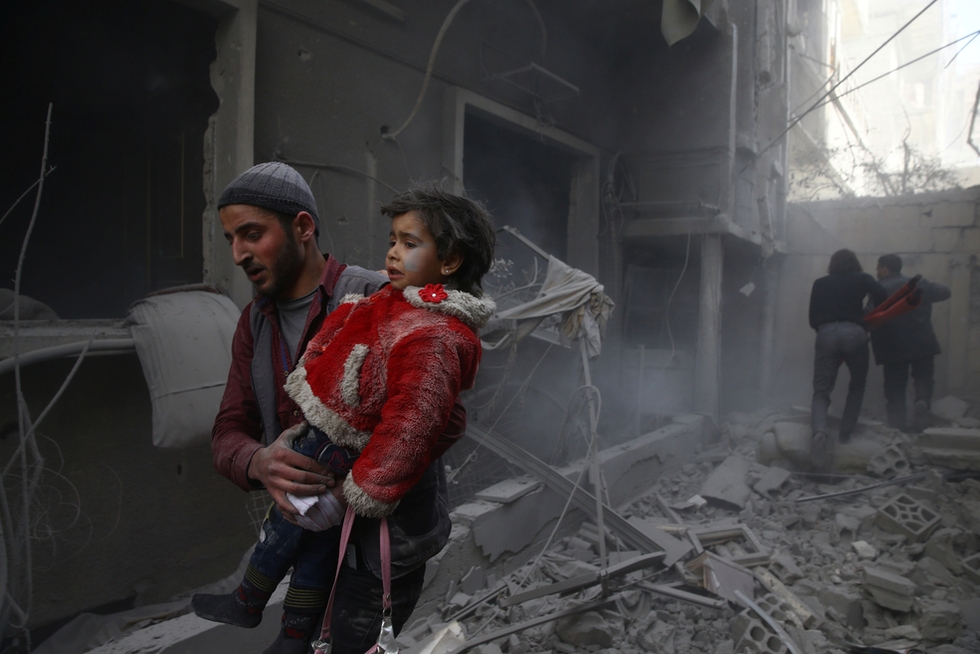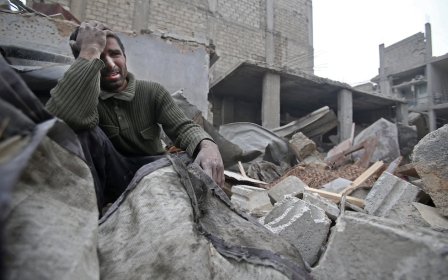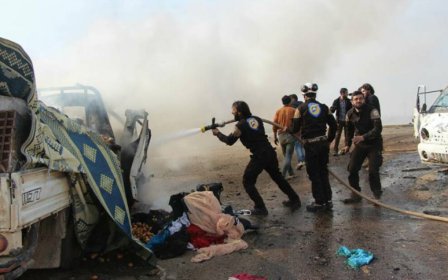'Only God can stop this': Eastern Ghouta reels from Russian bombs

It was around 11am when Russian and Syrian air strikes began bombing neighbourhoods across Eastern Ghouta, on the outskirts of the Syrian capital Damascus on Wednesday.
Homes across the rebel-held enclave vibrated with every explosion, as civilians huddled together in cellars and their homes waiting for the bombs to stop.
The third day of intense air strikes targeting the enclave saw the death toll reach 130 on Wednesday, according to monitoring groups and locals.
The Syrian Observatory for Human Rights dubbed Tuesday's death toll as the "largest massacre in Syria" since last April's chemical attacks in Khan Sheikhoun in Idlib.
We depend on wells that we've drilled for water. We know its unsafe, but there is no other option
-Amar al Bashy, Eastern Ghouta resident
With the continued shelling across Eastern Ghouta, Omran Aldoumani, an 18-year-old photographer, hid along with his family in their home in Douma.
"Massacres are happening daily, and we are sitting here unsure of what will happen next," said Aldoumani, who lives in eastern Ghouta, a designated de-escalation zone.
"Only God can stop these bombs," he told Middle East Eye.
De-escalation zones
Both Russia and Syria intensified their air strikes on the rebel-held area after a hardline group downed a Russian warplane on Saturday.
The UN on Tuesday condemned Syrian President Bashar al-Assad and Russia for its escalation and said it made a "mockery" of the de-escalation zones, established to reduce the violence in Syria.
But the renewed bombing of Eastern Ghouta has proven otherwise.
The air strikes have hit residential areas, medical centres and markets. Schools were forced to close down for months to ensure the safety of children and teachers.
"There used to be some medical points, but four of them closed as a result of the shelling," said Amar al-Bashy, who lives in Eastern Ghouta.
"The remaining medical facilities are suffering a lack of basic medical supplies. People are feeling the fear. There are no shelters nor safe places to avoid the shelling," he told MEE.
'Lucky to have one meal.'
Opposition rebels have held control of Eastern Ghouta since 2013.
Forces loyal to Bashar al-Assad have imposed a four-year-long siege and have continuously bombed the enclave in a bid to smoke out rebels groups.
Unlike other rebel-held territories, Eastern Ghouta has born the brunt of Syria's ongoing civil war, from multiple chemical attacks to indiscriminate bombing of the area.
Food and water shortages have further compounded the precarious situation in the enclave with many scraping together what they can find to feed their families.
Late last year, the United Nations reported that nearly 12 percent of children under five in the area suffered from malnutrition - the highest rate recorded since the start of the war.
"UN aid is non-existent because Assad's regime is preventing them from entering east Ghouta," said al-Bashy.
"Since the siege began we've stopped having three meals a day. Most people now are lucky to have one meal a day, with many surviving on a single meal every two days or more.
"We depend on wells that we've drilled for water. We know its unsafe, but there is no other option," al-Bashy told MEE.
More than 470,000 Syrians have been killed in the ongoing civil war. Many thousands languish in refugee camps outside the country or remain internally displaced, as the war rages on.
For Aldoumani, like many Syrians living in eastern Ghouta unable to leave the rebel enclave, the air strikes have become a part of everyday life.
"With the shelling continuing for days, it has become part of everyday life for many Syrians in Eastern Ghouta," said Aldoumani.
"You get scared when the bombs get close to your home, but after a while, you get used to it."
New MEE newsletter: Jerusalem Dispatch
Sign up to get the latest insights and analysis on Israel-Palestine, alongside Turkey Unpacked and other MEE newsletters
Middle East Eye delivers independent and unrivalled coverage and analysis of the Middle East, North Africa and beyond. To learn more about republishing this content and the associated fees, please fill out this form. More about MEE can be found here.




